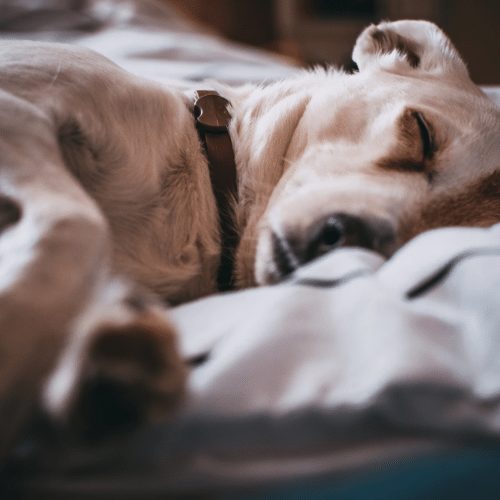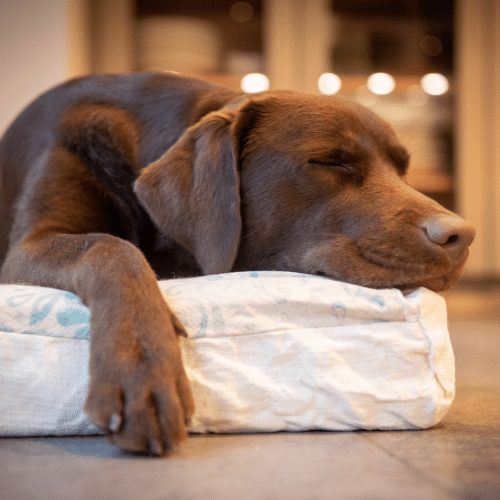Why Is My Rescue Dog Sleeping So Much?
June 10, 2021 2021-06-10 13:02Deciding to adopt a dog from a rescue organization is one of the most loving things you can do for an animal. Dogs and puppies, usually through no fault of their own, wind up in overcrowded rescues every day with limited resources available to accommodate every one of them. Adopting a dog means you are not only saving his life, but you are opening a spot in that rescue for another dog to be helped.
When you bring your dog home, there is always going to be an adjustment period. Sometimes this includes dogs hiding, refusing to eat, or sleeping much more than usual. Let’s take a look at some reasons why rescue dogs sleep more than expected.
Table of Contents

Is this much sleep okay for my rescue dog?
Usually, yes. Dogs deal with a lot when they’re in a rescue environment. The reasons dogs end up in rescue vary, but some common ones are:
- Owner Surrender: the dog’s owner has decided to turn the dog over to a rescue and relinquish all rights.
- Stray Hold: the dog is brought into rescue by a concerned person who found him. The dog’s owner is not immediately known and sometimes never found.
- Authority Removal of Neglected Animals: the dogs are removed from situations that are neglectful and abusive by animal welfare authorities.
- Natural Disaster: after a weather-related incident, such as a hurricane or tornado, newly-homeless dogs are rounded up and moved to rescues for safety.
In all of these situations, you can imagine the stress the dog has been through already. To have a home and suddenly be taken to the rescue by the owner he always had is confusing and scary. If the dog is a stray or a victim of a disaster, the fear he’s experienced just trying to survive has already taken a toll on his energy and spirit.
Abused animals have never known comfort or peace and now have to face an entirely new situation in rescue. Sleep is not something that comes easy to these dogs. Constantly on alert, they’re always sleeping with one eyes open to make sure of what’s happening next. You rarely see a dog sleep peacefully in a rescue.
When the dog is out of rescue, the exhaustion catches up with them quickly.

In the rescue
Depending on the type of rescue organization, there are different environments for each. In a shelter, dogs are in kennels that line the walls.
They’re cared for and taken out for walks by shelter workers or volunteers. This dog has gone from a house, where he was loved and cared for, to now living in a cage. Or, he’s gone from a terrible situation to a less terrible one, but that is still not ideal.
Either way, this dog has a lot to process. Watching the other dogs around him, he can sense they are scared and confused, as well. This intensifies stress levels and anxiety. This dog doesn’t know what’s going to come next and since it’s impossible to explain it to him, it’s difficult to provide comfort.
When a dog’s life gets turned upside-down, even if they can fall asleep, it’s usually not a peaceful one. Dogs are woken constantly in rescue by other dogs barking and crying. People come in and out to clean the kennel and provide food and water. Their environment is strange and unfamiliar, and as exhausted as they may be, resting is not easy.
Bringing your rescue dog home
After everything your dog has been through, he gets chosen by you to be a new member of your family. His luck is finally turning around! You’re excited to bring him home and introduce him to his new life.
The dog, however, just views this as yet another change. Something else that’s new and scary, he’s unsure of what’s going to happen next. Some dogs slip right into a new routine and adjust just fine. Others may take a little longer to get used to a new life and build up trust. Patience is needed as you help your dog learn that his new home is a safe place.
Your home is very different from the rescue. Food, water, maybe a crate with blankets or a toy, and that was your dog’s life in his kennel. If he came from a neglectful or unsafe situation prior to rescue, your home is likely the safest place he’s ever known. He may curl up on the hardwood floor instead of the rug or his own bed or your couch (if he’s allowed up!) because he’s used to sleeping on concrete. He may choose to sleep under a table or bed to limit his exposure and feel secure. Wherever he chooses to sleep, it’s the most comfortable spot he can find at that time, even if you don’t understand how it possibly can be.
He sleeps so much!
I bet! Once your rescue dog finds a spot to curl up, he will finally have a real chance to fall into a deep sleep.
This is a chance he has been deprived of for weeks, sometimes months, and possibly – years.
Have you ever been so exhausted that you felt you could sleep for a week? Now imagine not only not being able to sleep soundly at all, but also having that feeling perpetuated day after day.
Always being nervous and unsure, never being able to relax. Being sad that you had a home and aren’t in it anymore. Thinking that this present moment in time will be forever. The emotional, physical, and mental exhaustion would change who you are fundamentally.
Have you ever seen a video of a dog looking sad and scared in a shelter, but once he’s adopted, he’s happily running in his new backyard? He looks like a different dog. His personality was affected in the shelter. And he’s no longer exhausted.

If your rescue dog is sleeping more than you had anticipated, pay attention to how he acts when he’s awake.
- Is he eating regularly?
- Is he drinking enough water?
- Is he having normal potty breaks? Watch for loose stool or problems urinating.
- Does he seem to be in pain? Any limping or yelping as he moves?
- Does he seem interested in toys/playing?
If you don’t see any signs of illness or pain, he may just be enjoying finally having the ability to sleep in peace.
Other sleep factors
Comfort for your dog is the primary factor in his ability to sleep soundly. Is your home noisy? Are there kids running back and forth? This can affect the dog’s sleep schedule. But if your home is relatively quiet, a rescue dog can easily sleep most of the day away. Some other factors to note when considering your dog’s sleep schedule are:
- The dog’s age: A puppy will take a series of frequent short naps throughout the day. An older dog will sleep more during the day, as well.
- Health issues: dogs with certain illnesses or health conditions will sleep more than a healthy dog.
- Boredom: if your dog has nothing else to do, sleeping is a good way to pass the time.
If your dog is sleeping during the day but staying up all night, you might want to consider changing his schedule.
The bottom line
Your rescue dog is sleeping so much because he finally can. Sleep deprivation in rescue environments is quite common. Sleeping for long stretches of time can simply mean your dog is catching up on rest he hasn’t had for weeks, if ever. Some dogs sleep a lot for other reasons, including age and health conditions. However, if your dog is newly rescued, he has a lot of adjusting to do. Let him sleep as long as he feels he needs to so that he can get back to his normal personality and start living his new life in his forever home.
When your dog is awake, pay attention to his behavior. Notice any signs of possible illness, such as refusing food, showing no interest in playing, or being generally lethargic. While sleeping for long periods of time after leaving a rescue is normal, it’s always important to rule out health problems. If the sleep routine doesn’t change after a couple of weeks, a trip to the vet might be in order. There, they can examine your dog and determine any underlying physical conditions that might be causing his fatigue.
This might include blood tests and X-rays, but it’s important to know for sure why your dog is feeling the need to sleep so much.
If he gets a clean bill of health at the vet, your dog simply feels comfortable and safe enough in your home to allow himself to fall into a deep sleep. This shows how much he trusts you, too. Dogs are vulnerable when they sleep, and if yours is sleeping soundly next to you, he finally feels safe enough to do so. You truly did save his life, and he’s enjoying it.

